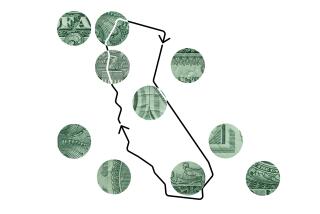Meeting Name Changes, but It’s Still Ruff Stuff
- Share via
The public address system is playing “My Way” just before the lights go dim and Howard Ruff strolls to the lectern. From the back of this enormous ballroom at the Anaheim Hilton and Towers he looks tiny, until a huge television screen to the left of the lectern flickers on and there he is, ready to bash big-spending congressmen and extol the virtues of precious metals and canned food.
About 1,800 people have come to hear this litany, which is already familiar to many of them from reading Ruff’s newsletter of financial advice, the aptly named Ruff Times.
While they’re here, they can also use his travel agency, Howard Ruff Travel--”You are special to us, so we make travel special to you”; buy silver medallions from his Liberty Mint; buy coin and bullion from a dealer called Ruffco, which Ruff recently sold; sign up for an investor “boot camp” in Utah at Ruff’s Jefferson Institute for Financial Independence; make a contribution to Ruff’s political action committee and his conservative lobbying organization, Free the Eagle, or subscribe to one of the other newsletters yet another Ruff company publishes. This year the travel agency is touting a trip to the Soviet Union led by--you guessed it--Ruff himself and syndicated columnist Jack Anderson, whose newsletter Ruff publishes.
If you’re starting to discern a pattern here, better wait a minute: The conference used to be called the Ruff Times convention, but this year for the first time it’s the National Conference for Independent Investors. The idea is to downplay the Ruff name a little in order--Ruff says--to get a broader selection of speakers, who won’t have to feel as if they’re implicitly touting his newsletter by speaking at a Ruff Times convention.
The convention, which started Sunday, ends today.
A little more than 10 years ago, Howard Ruff was just another guy publishing a financial advice letter. Then he wrote “How to Prosper During the Coming Bad Years,” a 1978 best seller that put him near the forefront of a small group of doom-and-gloom prognosticators.
The only problem was that the nation shortly afterward lurched into its longest postwar recovery and the market climbed to record heights before the 1987 crash.
Still, the book and the newsletter and the fame that came with them made Ruff a rich man. Ruff, a Mormon who lives on a mountain in Utah, expanded until his empire brought in $90 million a year; that’s before he sold Ruffco, the precious-metals company, last year. Ruff says he was panning gold as an investment in the newsletter so often that he was hurting sales at the metals dealer.
Viewed with no small amount of disdain by the Wall Street establishment, Ruff professes to be unconcerned.
In a VIP room off the ballroom, in fact, he is still predicting a depression around the corner.
“I’d say the chances are 50-50, but if you put a gun to my head, yes, I’d have to predict a depression,” he says.
Much of his advice is on how to cope with the aftermath of the disaster; things like buying silver--in case paper money becomes worthless--and stocking supplies of food.
Just in case the apocalypse is lurking out there somewhere, you can also buy at the conference $1,589 worth of 3- and 5-pound cans of dried milk, soup and wheat and other provisions--a year’s supply of food--from Nitro-Pak Survival Foods & Supplies in Norwalk. (“Will your family starve during the coming food riots,” the company’s literature asks, “even with a house full of gold, silver and rare coins?”)
But fewer people seem to accept Ruff’s views these days, judging by subscriptions to Ruff Times, even though Ruff has toned down his direst predictions in recent years. In 1979, the newsletter reached a peak of 175,000 subscribers. Now it has a mere 50,000. Ruff blames a wave of competitors that also used Ruff Times’ mass-mailing techniques to attract subscribers. Ruff says he stopped his own mass mailings years ago and left his competitors to fight it out. The competitors, however, knocked each other off, and now Ruff says he’s ready to start marketing the newsletter again.
In 2 years, Ruff predicts, he’ll have 200,000 subscribers. But his predictions for his own projects have sometimes been wrong too. In 1983 he predicted that the newsletter would bring in $25 million a year by 1986. That never came to pass; instead sales that year were only $9 million.
Who reads Ruff Times? According to Ruff’s statistics, the average reader is upper middle class, with an income of $54,000 a year and 52 years old. Two out of five readers own their own business, usually a small one.
At the conventions, the crowds tend to be even older, because retired people have the time to spend 3 days listening to speeches on “Big Money Strategies for Rough Times”--the theme of this year’s convention--and “Using Technical Analysis to Maximize Profits in This Roller Coaster Market.”
Among some neatly coiffed businessmen in conservative suits strolling the Hilton, there are also plenty of older people in sports clothes, loud plaid blazers, cardigans and knit golf shirts.
Ruff’s folksy, plain-spoken conservatism clearly appeals to this sort of audience. They like the fact that his lobbying group, for instance, mounts guard in Washington against “threats to the free-enterprise system.”
More than the conservatism, though, these people appreciate that Ruff at least seems to care about small investors like themselves. They don’t trade stocks on inside information or manipulate the junk bond market; some of them, in fact, see Wall Street as a phalanx of fat cats with little interest in small fry like themselves.
They are like Katherine Juday, a retired schoolteacher from the San Diego area, who said of Ruff: “He’s interested in the middle class, in the small investor. People with a small amount of money can get something out of it.”
Or there’s Carl and Eleanore Mou, who realized a windfall when they sold their house in Diamond Bar and moved to the desert 4 years ago, and who now invest in rare coins and silver as well as stocks.
“Howard Ruff is a fine man, a family man,” said Carl, 70, a retired truck driver. “Just being associated with Howard Ruff is an education in itself.”
Some of them are unusually knowledgeable investors, and most of them at least seem to take Ruff with a grain of salt.
“Do I think the economy’s going to collapse? Not really,” said Jerry Allen, 46, of Chino, who inspects construction projects for developers.
“But it didn’t cost me much to buy some silver. So if (a depression) does come, I’ll have something to spend, because dollar bills won’t be worth anything.”
More to Read
Sign up for The Wild
We’ll help you find the best places to hike, bike and run, as well as the perfect silent spots for meditation and yoga.
You may occasionally receive promotional content from the Los Angeles Times.






